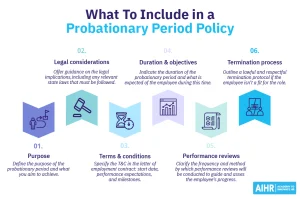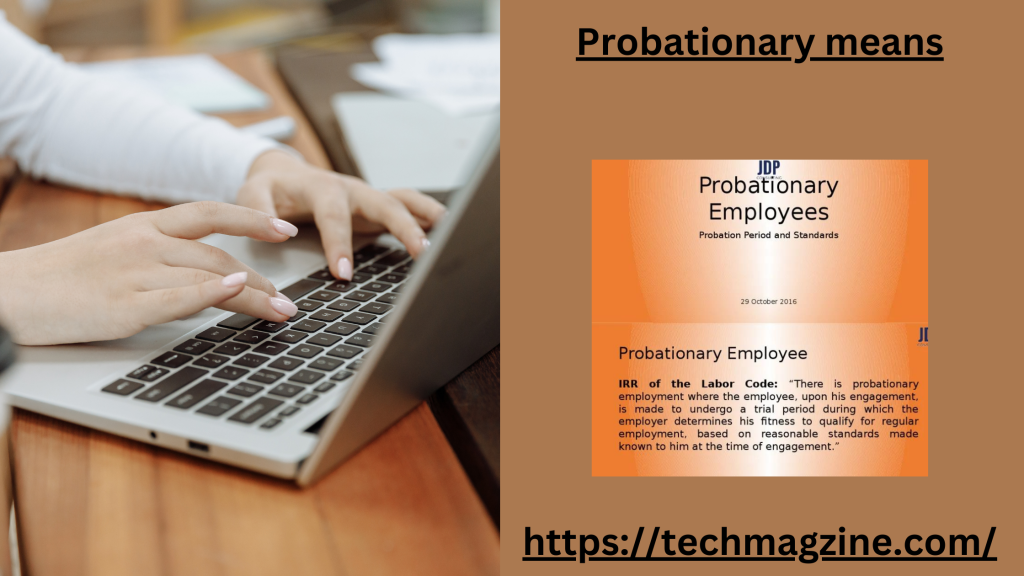Probationary means is a term frequently used in the context of employment, legal frameworks, and academic settings. It refers to a specific period or condition in which an individual’s performance, behavior, or ability is under evaluation before a final decision is made. This probationary phase is often critical, as it determines whether the individual will be granted permanent status or face potential consequences such as termination or removal from a program. In this article, we will explore the concept of probationary means, its importance, applications across different fields, and key considerations for both individuals and organizations during this phase.
What Does Probationary Means?
The term “probationary means” refers to a temporary status given to an employee, student, or legal offender during which their performance or behavior is monitored and evaluated. This phase allows organizations or institutions to assess whether the individual is suitable for a long-term position or benefit from further training or correction.
In the workplace, probationary means that a new hire is under review for a specific time, usually 3 to 6 months, to determine their compatibility with the company’s culture, values, and job expectations. The same term applies to students or trainees who may be placed on academic or behavioral probation if their performance is below the expected standard. Similarly, probationary means can be applied in the legal context, where offenders are monitored under certain conditions as an alternative to incarceration.
Importance of Probationary Means in Employment
In the employment context, probationary means an essential tool that benefits both employers and employees. For employers, it offers the chance to observe a new hire’s work ethic, skills, and overall contribution to the organization. During this phase, employers can evaluate whether the employee fits well into the company culture, meets performance standards, and has the potential for long-term growth.
From an employee’s perspective, probationary means a time to prove their capabilities and adapt to the company’s expectations. It offers a buffer period during which employees can adjust to their new role without the immediate pressure of a permanent contract. If successfully completed, the probationary period typically leads to full employment benefits, job security, and the removal of the temporary status.
Legal Implications of Probationary Means
Probationary means also holds significant weight in legal matters, particularly in criminal justice systems. In this context, it refers to a period during which an offender is released from custody but remains under supervision. The individual is expected to comply with specific conditions, such as attending counseling sessions, performing community service, or avoiding certain people or places. Failure to meet these conditions can result in the revocation of probation and lead to imprisonment.
The probationary means in legal terms serves as a rehabilitative measure, offering offenders a chance to reintegrate into society while maintaining oversight. It also reduces the strain on prison systems by providing an alternative to incarceration.
Applications of Probationary Means in Education
In education, probationary means applies to students who fail to meet academic or behavioral standards. Students placed on probation are given a set amount of time to improve their grades or behavior. Failure to meet these requirements may result in suspension or expulsion. For example, a university may place a student on academic probation if their GPA falls below a certain threshold, offering them time to recover and meet the necessary academic standards.
Educational institutions use probationary means as a way to ensure that students maintain high academic standards and are serious about their educational journey. It serves as a warning system, giving students the opportunity to address shortcomings before facing harsher consequences.
How Employers Use Probationary Means
In many industries, employers use probationary means as part of their recruitment and onboarding process. When a new employee joins, they often start on probation, which typically lasts for three to six months. During this period, both the employer and the employee assess whether the job and working conditions meet their mutual expectations.

For employers, probationary means a period where they can evaluate the employee’s:
- Work Performance: Assessing the quality, speed, and accuracy of the employee’s work.
- Cultural Fit: Determining how well the employee aligns with the company’s values and team dynamics.
- Learning Curve: Monitoring how quickly the employee adapts to the role and the company’s processes.
- Behavior and Attitude: Observing how the employee interacts with colleagues, clients, and management.
At the end of the probationary period, employers will decide whether to offer permanent employment, extend the probationary period, or terminate the employment contract. In some cases, employees may also decide that the role or company is not suitable for them and choose to leave.
Key Considerations During Probationary Means
For both employers and employees, the probationary means comes with important considerations:
1. Clear Communication of Expectations
Before the probationary period begins, it’s crucial that both parties clearly understand the expectations. Employers should outline performance benchmarks, behaviors, and skills they expect from the employee, while employees should have a clear understanding of their job responsibilities and company policies.
2. Regular Feedback
Throughout the probationary period, feedback is essential. Employers should provide regular performance reviews, highlighting both strengths and areas for improvement. Employees, in turn, should seek feedback and actively work on developing the skills or behaviors required to meet job expectations.
3. Documentation
Both employers and employees should keep detailed records during the probationary means. Employers need to document instances of good and poor performance, while employees should keep track of any feedback they receive and their progress toward meeting company standards.
4. Fairness and Transparency
Probationary means should be implemented fairly, with clear criteria for evaluation. Employees should feel that they are given a fair chance to prove their abilities, and any decisions at the end of the probationary period should be based on documented evidence and not subjective opinions.
5. Legal Rights
It’s important to note that even though an employee is on probation, they still have legal rights. Employers must ensure that any actions taken during or after the probationary period comply with employment laws, including rights to fair treatment, protection from discrimination, and the correct notice periods.
Common Misconceptions About Probationary Means
There are several misconceptions about what probationary means in the employment context. Here are a few to clarify:
- Probation is a Trial Period, Not a Guarantee: Completing probation does not always guarantee permanent employment. It simply means that the employer has the option to either continue with the employment or not, based on performance and other criteria.
- Probation Can Be Extended: In some cases, employers may extend the probationary period if they feel that the employee has potential but has not fully demonstrated the required skills or behaviors.
- Employees Still Have Rights: Employees on probation are not without rights. They are entitled to fair treatment, access to benefits (depending on company policy), and cannot be dismissed without reason or proper notice.
Conclusion
Probationary means represents a crucial period of evaluation and adjustment across various fields, including employment, education, and the legal system. In employment, it serves as a valuable tool for both employers and employees to assess long-term compatibility. Legally, probation offers offenders an opportunity for rehabilitation and reintegration into society, while educational probation allows students a chance to improve before facing more severe consequences.
Understanding what probationary means and how it works is essential for navigating this critical phase successfully. Whether you’re an employer seeking to implement a fair and productive probation system, an employee aiming to prove your worth during the probation period, or a student striving to meet academic standards, probationary means can serve as an opportunity for growth and positive change.
